The OeAD was founded on 13 November 1961 as an association, the “Austrian Foreign Students Service”, to provide foreign students in Austria with the necessary basics to be able to study successfully. In 2009 the OeAD was converted into a limited liability company (GmbH) of the federal government and since then our portfolio has continuously been enlarged. In addition to our focus on internationalisation the national education agendas at the OeAD have been expanded by the Federal Ministry of Education, Science and Research (BMBWF). In 2021 the OeAD’s name was changed to “OeAD – Agency for Education and Internationalisation” to reflect this development. The OeAD is active in Austria, Europe and internationally in priority countries. With our programmes we advise, support and connect people and institutions in education, science, research and culture. The milestones show the OeAD’s most important steps in the context of European and Austrian developments that have influenced us from 1961 to 2022. Join us on this journey through time!
1960s
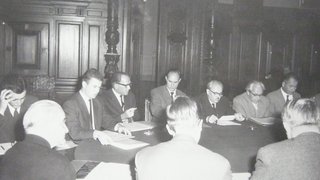
Foundation of the Austrian Foreign Students Service ÖAD (today: OeAD) as an association of the Rectors’ Conference and the Austrian Student Union (ÖH). On the occasion of the OeAD’s constituent general assembly the Austrian Rectors’ Conference (ÖRK)’s representative, Prof. Dr. Kühn, explains: “The international students, especially those from developing countries, have to struggle with many problems from the beginning of their studies and throughout their studies, most of which Austrian students are unfamiliar with. For example, difficulties with the language, with adapting to a completely foreign environment and with the contact with the local people. Special attention must be paid to the study difficulties of international students. They will only return to their home countries as friends of Austria if they achieve their study goals in the shortest possible time. In case of failure they will put the blame primarily on Austria and our higher education institutions.” Work visits and the establishment of the first University Preparation Programme in Leoben followed.
Photo: OeAD constituent meeting
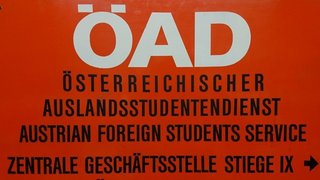
The Austrian school system is reformed by a comprehensive education act. The OeAD’s board of trustees holds its constituent meeting. Further university preparation programmes and the first OeAD branch offices in the federal provinces are established. The first few commissionings by the Ministry of Education and press conferences on key topics follow.

Cooperation with the higher education institutions and networking with stakeholders starts. An OeAD research institute is established for carrying out analyses, studies and statistics, especially for students from developing countries; student liaison officers for international students and scholarship files for individual support are introduced. The OeAD publishes specialist publications for the first time.
Photo: Lesson at the University Preparation Programme Mödling
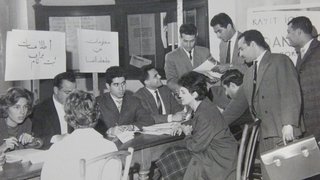
The OeAD starts to provide comprehensive information, guidance and support for international students. Particularly important is the good and intensive cooperation with the Austrian Rectors' Conference. The research institute is expanded.
Photo: Enrolment counselling for international students with significant participation of the OeAD

The signing of the EC merger treaty is regarded as the starting point for significant actors in education policy such as the European Commission (founded in 1967). The OeAD is recognised by national partner organisations, cooperation with the Ministry of Foreign Affairs starts and cooperation with partners such as the Austrian Student Union (ÖH), the International Student Club (CIU), the Afro-Asian Institute (AAI), etc. is intensified The OeAD also supports the UNESCO and the OECD through the development and evaluation of questionnaires. Study-related publications in several languages are published.
Photo: First edition of the Study in Austria periodical
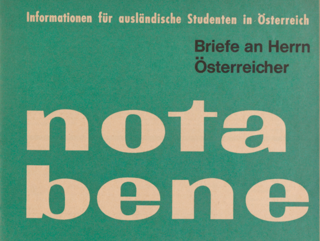
As of 1968 the Federal Government concludes bilateral agreements called “Scientific and Technological Cooperation” (S&T Cooperation) to intensify international research cooperation. The “Prague Spring” becomes a touchstone for the OeAD as far as refugee student support is concerned. The OeAD proves itself as a crisis manager for around 150 persons. In 1968 the OeAD publishes a greater number of statistics relevant to the higher education strategy for the first time.
Photo: An early edition of the magazine nota bene
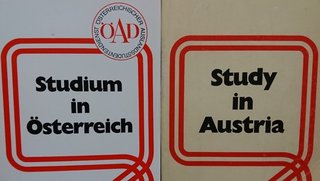
The Hague Summit provides another important impulse for European education policy. It is agreed that education can contribute significantly to the development of a European identity and should therefore be put on the agenda. The Study Subsidies Act introduces study grants and scholarships for gifted students; to administer them the Study Subsidies Authority is founded. The OeAD is now the largest study and social support institution for international students in Austria (approx. 11,000) – some of our services, e.g. ÖAD study counselling, Austrian students are also happy to use. In 1969 the OeAD assumes the management, processing and disbursement of scholarships for convention refugees.
Photo: Multilingual publications are rapidly gaining importance in international educational mobility
1970s
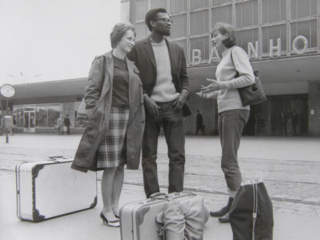
The OeAD manages more and more scholarship programmes on behalf of the Federal Ministry of Science and Research: the exchange scholarship programme for science universities, the art scholarship exchange programme and the scholarships for Austrians living abroad are becoming more and more the OeAD’s focus.
Photo: Pick-up service of the OeAD for scholarship holders from abroad at the train station Westbahnhof Vienna
There are heated discussions in Austria about changing the admission regulations for international applicants. The Austrian Rectors’ Conference sets up a committee to draw up the new guidelines for the admission of international applicants and adopts them in December 1974. It is also a turbulent year for the OeAD, which is affected by the upheavals, for example by “room occupations by students”. A legal advice service for international students is set up at the OeAD.

The University Organisation Act 1975 (UOG '75) comes into force. Key issues: inclusion of mid-level faculty and students in collegial decision-making bodies, expansion of state control and change of name of all scientific higher education institutions to universities. The OeAD establishes itself as an advisor on higher education policy issues. In 1976 the European Ministers of Education agree on joint cooperation in education in a Council resolution, thus laying the foundation for a first action programme in the field of education, which includes six measures with a total of 22 sub-programmes (which will shape the development of the education policy until the 1990s).
Photo: The minister of science Hertha Firnberg and the OeAD’s general secretary Ludwig Koller talking to each other, in the background an OeAD scholarship holder
A general decree of the Ministry of Education introduces civic education as a school subject. New focal points have developed in the OeAD: The OeAD brings foreign language lecturers from abroad to Austrian universities and becomes involved in cultural and scientific administration.

In the 1980s, the OeAD was already regularly publishing information in four languages.
The European Commission can be described as the driving force behind the development of the higher education policy (recognition, etc.) in the 1970s. The OeAD publishes an overview of all study options in Austria for the first time.
Photo: In the 1980s the OeAD already publishes information in four languages at regular intervals
1980s

From the 1980s onwards a Community-friendly jurisprudence of the European Court of Justice (ECJ) opens up new scope for action for the EC. In its rulings the ECJ interprets the higher education policy as a component of vocational education and training, thus providing it with a “legal basis”. The EU education information network EURYDICE is launched.
Photo: On the occasion of a reception for scholarship holders at the Viennese Hofburg (1980): Federal President Rudolf Kirchschläger (left), OeAD President Günther Winkler (right), in the middle: OeAD scholarship holders
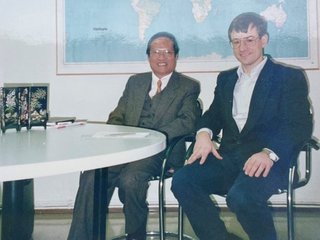
The OeAD improves the support measures for international students in Austria and the OeAD’s North-South Dialogue Scholarship Programme starts. This is the Austrian Development Cooperation’s biggest funding programme in the field of science. The programme supports doctoral studies and research stays and contributes significantly to capacity development at higher education institutions in developing countries.
Photo: Ulrich Hörmann from the OeAD with a vice-minister from Vietnam.
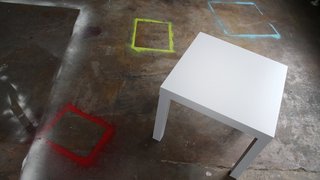
The University Entrance Qualification Act regulates the introduction of “field of studies-related university entrance qualifications” for persons without secondary school leaving examination. The introduction of the subject “computer science” encourages the OeAD to computerise its scholarship administration. A development aid scholarship commission is set up at the OeAD. Günther Winkler, the OeAD’s president, says in his speech on the occasion of the OeAD’s 25th anniversary: “Internationality is a cornerstone of modern science for universities and other higher education institutions. Optimal development can only take place in an international context. However, this openness to the world, and thus also internationality, does not happen by itself. A scientific and research climate that promotes open dialogue and cooperation, a personal willingness to spend some time teaching or studying abroad on the part of the lecturers and students; international scientific communication requires an open-minded and broad attitude on the part of scientists, researchers and students as well as subsidiary measures of an institutional, organisational and financial nature.”
Photo: Scene from the former artist’s workshop of KulturKontakt Austria in Gredlerstraße
After several years of preparation the EU starts the ERASMUS programme with eleven countries, thus giving the starting signal for higher education institutions to increasingly address the topic of academic relations with other countries and international mobility. Austria cannot yet join the programme as it does not have formal candidate status.
The European Commission also supports stays of university lecturers within the framework of the higher education cooperation programmes. In order to offer the target group of international scientists and scholars as well as university lecturers in Vienna a single point of contact and support the “International Academic Center – Vienna” is established as a department of the OeAD based on an initiative of the OeAD and with financial support from the ministry of science.

This year is a pivotal year in the history of Europe. The fall of the “Iron Curtain” and the countless political upheavals in Central, Eastern and South-Eastern Europe also set the course for international educational, culture and research policy. In Austria the association KulturKontakt Austria is founded and the Office for European Educational Cooperation (BEB) (a predecessor of the National Agency) and the Office for Exchange Programmes with Central and Eastern Europe (BAMO) are established; an office for development aid is also established.
1990s
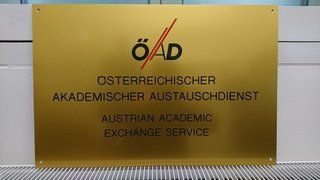
The Viennese Conference of Ministers of Culture revitalised the cultural relations and cultural exchange between Austria and the countries of Central, Eastern and South-Eastern Europe. In the field of education they enter into an open dialogue and international cooperation: Establishment of the Service and Information Office for Eastern and South-Eastern Europe at the Ministry of Education with budgets for educational cooperation with Central and Eastern Europe. Foundation of the “Aktion Austria-Hungary”. The universities begin to set up International Offices and the OeAD unites the Office for European Educational Cooperation (BEB), the Office for Exchange Programmes with Central and Eastern Europe (BAMO) and the Office for Scientific and Technological Cooperation (S&T Cooperation) in the newly founded liaison office. The many new tasks bring about a change of the OeAD’s name from “Austrian Foreign Students Service” to “Austrian Academic Exchange Service”.
1991 is another decisive year for Europe: declarations of independence by Slovenia, Croatia, the Baltic countries and Ukraine. Beginning of armed conflicts and dissolution of Yugoslavia, dissolution of the Warsaw Pact, dissolution of the Soviet Union, end of the communist regime in Albania.

With the Maastricht Treaty the objectives of the EU education programmes are coming into sharper focus. Erasmus is enshrined in the EU Treaties of Maastricht “to promote cooperation between EU member countries to develop high quality education”. Austria joins Erasmus and the OeAD becomes the national agency for the EU programme. Other European programmes such as SPES, Comett (cooperation between higher education institutions and businesses in education, training and further education) and Science start. The ministry of education sends the first few education officers for pre-university education to Central, Eastern and South-Eastern Europe. The “Aktion Austria – Czech Republic” is founded as a joint project to promote bilateral cooperation in tertiary education and science.
Photo: The minister of science Erhard Busek sees the first few Austrian Erasmus students off at the Westbahnhof train station in Vienna in 1992.
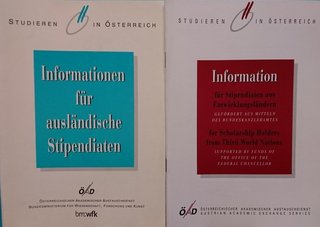
Czechoslovakia splits up: the Czech Republic and Slovakia are established. The Maastricht Treaty enters into force. It is significant because it not only lays the foundation for a pan-European economic and monetary union but also integrates education into the catalogue of common activities for the first time: “The Community shall contribute to the development of quality education by encouraging cooperation between member countries and, if necessary, by supporting and supplementing their action while fully respecting the responsibility of the member countries for the content of teaching and the organisation of education systems and their cultural and linguistic diversity”. (Maastricht Treaty, 1992). The Federal Act on the Organisation of the Universities (UG '93) enters into force: State higher education policy withdraws from detailed control, thereby strengthening the position of the rectorates (keyword: “partial autonomy”). The Federal Act on the Fachhochschule degree programmes (FHStG) also comes into force: the establishment of shorter study programmes with an occupational orientation is one of the consequences. The Chair of “German as a Foreign Language” (DaF) at the University of Vienna is established, accompanied by the International Conference on Language Policy in Central and Eastern Europe. The OeAD becomes a member of the Academic Cooperation Association ACA.
![[Translate to English:] Corfu European Council Signing of the Accession Treaty of Austria to the European Union<br> seated from left to right: Ulrich Stacher, Member of the Austrian Federal Chancellery; Manfred Scheich, Ambassador of Austria to the EC; Franz Vranitzky, Austrian Federal Chancellor; Alois Mock, Austrian Federal Minister for Foreign Affairs](/fileadmin/Dokumente/_processed_/8/c/csm_1994_unterzeichnung_eu_vertrag_c_ek_audiovisual_services_1537c80de8.jpg)
seated from left to right: Ulrich Stacher, Member of the Austrian Federal Chancellery; Manfred Scheich, Ambassador of Austria to the EC; Franz Vranitzky, Austrian Federal Chancellor; Alois Mock, Austrian Federal Minister for Foreign Affairs
On 24 June Austria signs the EU Accession Treaty. In the referendum in Austria on the country’s accession to the European Union 66.6 % vote “yes”, the turnout is 82.3%. The Ministry of Education publishes the “Basic decree on holistic-creative education and project-related classes”. At the OeAD the Office for European Educational Cooperation (BEB) is entrusted with the management of the EU education and mobility programmes. CEEPUS (Central European Exchange Programme for University Studies) starts as the first student exchange programme linking Austria and its Eastern neighbours as equal partners. The OeAD publishes the “Entwicklungspolitische Vorlesungsverzeichnisse”, a compilation of courses offered at Austrian universities and relevant to developing countries. The ASEAN-European Academic University Network (ASEA-UNINET) is founded – a network of European and Southeast Asian universities.
Photo: Signing of the accession treaty between Austria and the European Union (seated, from left to right: Ulrich Stacher, Manfred Scheich, Franz Vranitzky, Alois Mock).
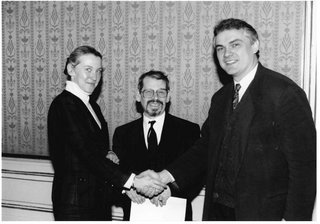
Austria has become a member of the EU. Austria’s accession to the EU leads to an increase in academic mobility within the European Union. Sweden and Finland also join. Norway cannot join due to a negative vote by the population. The multitude of individual programmes is united in two major programmes – “Socrates” and “Leonardo Da Vinci”: The educational programmes Erasmus (higher education), Lingua (language learning), Eurydice, Naric and Arion (all three: observation and innovation), Grundtvig (adult education) and Minerva (methodological research) are united in the “Socrates” programme (later on: “Lifelong Learning Programme”; as of 2014: Erasmus+) and complemented by the Comenius programme (school education). With the new legal framework of the Maastricht Treaty the inclusion of secondary education in the European education policy is finally accomplished through the “Comenius” programme. Since then the programme has been able to support the development of multilateral school cooperations that are based on European educational projects. In the “Leonardo da Vinci” programme (as of 2014: Erasmus+) funding programmes for initial and continuing vocational education and training are united and expanded.
Photo: Some persons who have accompanied academic mobility in Austria: Barbara Weitgruber (Ministry of Science), Ludwig Koller (Head of the former “OeAD association”) and Josef Leidenfrost (Socrates National Agency).
Foto: Wegbegleiter/innen der akademischen Mobilität in Österreich: Barbara Weitgruber (Wissenschaftsministerium), Ludwig Koller (Leiter vom damaligen „Verein OeAD“) und Josef Leidenfrost (Sokrates-Nationalagentur).

The European Voluntary Service is implemented as a separate programme. In Austria the Austrian Conference of Universities of Applied Sciences is founded, which later becomes a member of the OeAD association.
The Federal Act on Studies at Universities (UniStG) comes into force: the study law is deregulated and the 11 study laws are merged into one. Austria holds the EU Council Presidency for the first time in 1998 and sets numerous educational and cultural policy accents.
The first EU youth promotion programme, “Youth for Europe”, starts. Its aim is to support the encounter of young people across national borders. The OeAD founds its subsidiary, the OeAD Housing Office (OeAD-Wohnraumverwaltungs-GmbH), in 1998.
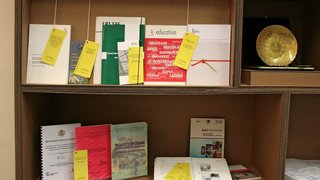
Kosovo is at war. The Treaty of Amsterdam harmonises the procedural rules for support measures in general education and vocational education and training so that all programmes are now subject to the co-decision procedure according to article 251 of the EC Treaty. In the Stability Pact for South-Eastern Europe countries, nations and ethnic groups that waged war against each other in the past decade or are directly affected by the consequences of war are in dialogue with each other. One of the declared goals is the development of a modern education infrastructure. The Task Force Education and Youth of the Stability Pact for South-Eastern Europe is chaired by Austria. 1999 sees the start of one of the most important reform processes in education – the Bologna Process for the creation of a common European higher education area – encompassing 33 EU and EFTA member countries and accession countries as well as Croatia, which aims to create a uniform European higher education system by 2010. The Ministry of Education develops the curriculum ’99: self-evaluation and quality development, interdisciplinary work, holistic school concept, core and extension areas in the syllabus, pupil orientation.
Photo: Brochures: Educational Cooperation with Eastern and South-Eastern Europe, KKA Exhibition 2009
2000s
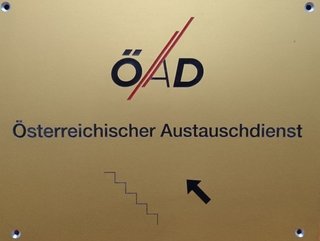
The federal government splits the research agendas and responsibilities for the higher education institutions and the technology sector between several ministries. The Austrian Private Universities Conference (ÖPUK) is founded. The Austrian Association of Universities of Applied Sciences (FHK) and the Federal Conference of Teacher Training Colleges become members of the OeAD. The OeAD is renamed “Austrian Exchange Service – Agency for International Cooperation in Education and Research”. The Eurasia-Pacific Uninet (EPU) is founded.
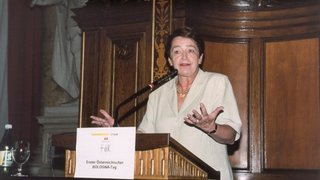
The European Commission becomes a full member of the Bologna Process and a driving force in the establishment of a single European higher education area. An Office for EU-Third Country Educational Cooperation is established at the OeAD.
Photo: Minister of science Elisabeth Gehrer at the first Austrian Bologna Day 2000
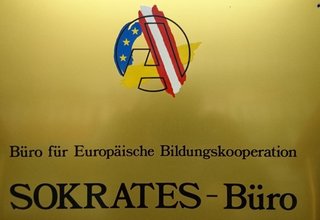
The euro is introduced in eleven countries. In March the European Council adopts a detailed educational policy work programme named “Work Programme Education and Training 2010”, which contains concrete objectives and a list of indicators to measure progress in implementing the objectives. Austria provides the Special Coordinator of the Stability Pact for South Eastern Europe until 2008. The OeAD is commissioned to present and promote Austria internationally in higher education. At the OeAD an adaptation and improvement of the procedures and processes for the EU programmes “Socrates” and “Leonardo” as well as for the Office for EU-Third Country Educational Cooperation begins.
The Treaty of Nice (Future Convention to prepare the EU enlargement) comes into force. The OeAD supports the University of Vienna as host of the EAIE Conference in essential aspects. Moreover, the OeAD starts merging its “scholarship offices” (BAMO, Development Cooperation, S&T Cooperation, Third Countries Educational Cooperation) into the “Office for Academic Cooperation and Mobility” to create and use further synergies.
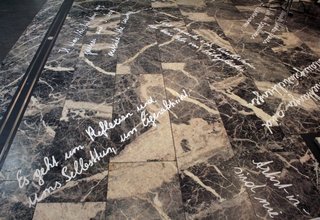
The eastward enlargement of the EU is in full swing: the Czech Republic, Estonia, Latvia, Lithuania, Hungary, Malta, Poland, the Republic of Cyprus, Slovenia and Slovakia join the EU on 1 January 2004. The Orange Revolution takes place in Ukraine. The change to the new University Act 2002 brings about extensive organisational changes in higher education and also leads to a shortage of financial resources in some areas. The Rectors’ Conference changes its name to Universities Austria (uniko). The OeAD’s President Alfred Ebenbauer calls for “positioning the OeAD as THE agency for international cooperation in tertiary education with strategic tasks.” In 2004 the two associations Österreichischer Kultur-Service (ÖKS) (Austrian Cultural Service) and the Office for Cultural Education are integrated into the association KulturKontakt Austria, where they represent the area of “Cultural Education with Schools”.

At its spring meeting the European Council confirms that “human capital” is Europe’s most important asset and needs to be promoted and used more. Therefore the member countries are again called upon to raise the general level of education and at the same time reduce the number of students who drop out of university. Moreover, further promotion of lifelong learning is sought. In March the European Commission publishes the European Charter for Researchers (EURAXESS) as part of a recommendation. An ECJ ruling is issued against the admission restrictions for medical studies at Austrian universities. The Rectors’ Conference of the Austrian University Colleges of Teacher Education (RÖPH) is founded. The OeAD takes on the management of several postgraduate scholarship programmes, the EU initiatives Europass and eTwinning are launched and the OeAD wins the new tender for the North-South Dialogue Scholarship Programme.
Photo: eTwinning award ceremony 2007 for the best projects. Among others, the primary school Volksschule Straß in Styria was awarded a prize.
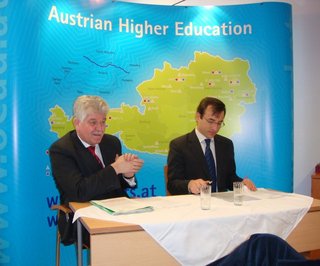
Declaration of independence by Montenegro. Austria takes over the EU Council Presidency for the second time. In January a new aliens law package comes into force, the OeAD offers events to inform those affected about the new stricter regulations. The OeAD is to become a limited liability company (GmbH) of the Republic of Austria in the “foreseeable future”, as stipulated in the government agreement. Preparatory work for this starts and the OeAD association is certified according to ISO 9001:2000, confirming our quality management system. The Ministry of Education and Science nominates the OeAD to the European Commission as the future executing agency “National Agency”.
Photo: Hubert Dürrstein and Ulrich Hörmann at an OeAD press conference
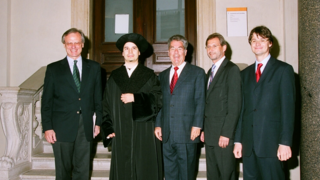
Romania and Bulgaria become members of the EU. The European Year is dedicated to equal opportunities for all. In Austria the teacher training colleges, which were previously not part of the higher education sector, are transformed into university colleges for teacher education. The increasing importance of general and vocational education and training (as part of the Lisbon Strategy) is also reflected in the growing budget for European education programmes for the period 2007 to 2013. At the proposal of the EU Commission the new integrated EU programme for “Lifelong Learning” is adopted, which unites the “Leonardo da Vinci” programme and the previous “Socrates” programmes, “Comenius” and “Erasmus” as sectoral programmes under a common roof. The sectoral structure will be accompanied by a programme component that is to primarily promote foreign languages, ICT skills, political cooperation and the dissemination of results. Internships abroad for students are a new feature. Moreover, mobility for general higher education staff starts. The OeAD now implements the EU Lifelong Learning Programme in Austria. Moreover, ARQA-VET (Austrian Reference Point for Quality Assurance in Vocational Education and Training) and the Sparkling Science programme start at the OeAD.
Photo: Festive event “ERASMUS – a success story” in the University of Vienna’s Arkadenhof on 9 May 2007. From left: Georg Winckler (President of the European University Association), “Erasmus of Rotterdam”, Federal President Heinz Fischer, Minister of Science Johannes Hahn and Ernst Gesslbauer, Head of the EU Programme for Lifelong Learning at the OeAD.

Kosovo's declaration of independence and formal recognition of the Republic of Kosovo by Austria. The European Council publishes the “Culture Agenda for Europe: Networking and Shaping within the framework of the EU Work Plan 2008-2010” and thus also focuses on the mobility of creative artists, the promotion of access to culture, synergies between education and culture, the promotion of multilingualism, creative industries and much more. The European Year of Intercultural Dialogue is proclaimed with the aim of promoting the benefits of cultural diversity. A compromise is reached on the question of a “European University” with the decision to establish a European Institute of Innovation and Technology (EIT). The Federal Ministry for Education, the Arts and Culture (BMUKK) issues the policy paper “Museum Policy Goals. Setting priorities on the basis of the museum policy initiative”. The OeAD organises the first of ten major conferences on “Quality Assurance in Vocational Education and Training” and thus supports the EU initiative EQAVET (European Quality Assurance in Vocational Education and Training) to promote this important topic.
Photo: Preparations for the “ORF Museum Night”

The Treaty of Lisbon enters into force. The Lisbon Declaration is regarded as the starting signal for the development of a knowledge-based society in the European Union. Under the heading of “Bildung und der Weg zum Aufschwung” the key messages of the EU Council of Education Ministers in February of this year point out the “great strategic importance” of “maintaining open and efficient high-quality education and training systems as a means of strengthening future competitiveness while at the same time promoting social cohesion and active citizenship”. With the Lisbon Strategy the European educational policy has entered a new phase: The new steering mechanisms and instruments place greater emphasis on the economic and employment policy objectives of the European education policy. “Erasmus Mundus” is expanded and is to make European higher education institutions more attractive to graduates and lecturers from all over the world. The year is designated the European Year of Creativity and Innovation. The first national education report is published in Austria. The Institute of Science and Technology (IST Austria) is founded in Klosterneuburg. The introduction of the New Middle Schools (Neue Mittelschule), which replaces the Hauptschulen constitutes another large-scale change at Austria’s schools. And the OeAD? It becomes a limited liability company (GmbH) of the federal government in 2009. The ASEA-UNINET office, the Commission for Development Studies (KEF) and the Sparkling Science programme are incorporated into the OeAD. A new department, the “Centre for International Cooperation and Mobility (ICM)”, is established. The lectureship programme, German as a Foreign Language (DaF) and the Scientific Documentation Centre are integrated into the OeAD. The national Bologna Service Point is established at the OeAD. The new Marietta Blau Scholarship promotes young academics.
Photo: With the taking over of new programmes the need for counselling also increases
2010s

The European Council adopts the “Europe 2020 Strategy”, which sets five measurable targets. The strategy focuses on “promoting research and development as well as higher education and employment to increase economic growth, better social integration and promoting environmentally friendly technologies”. Two of these directly affect the OeAD: research & development and education. The student protest in Austria against austerity measures results in the occupation of the University of Vienna’s main lecture hall Audimax. All Viennese OeAD offices move to the common address in Ebendorferstraße 7 in Vienna’s first district. The OeAD takes over the technical and administrative support of the EURASIA-PACIFIC-UNINET. The launch of the APPEAR programme for the promotion of higher education cooperation in priority countries and regions of the Austrian Development Cooperation (OEZA) should also be highlighted. The National Coordination Office for the NQF in Austria is now located at the OeAD. The incorporation of the lectureship programme is completed. The OeAD is entrusted with the presentation of Austria abroad as an attractive country for higher education.
Photo: Relocation to Ebendorferstraße 7, 1010 Vienna: the Minister of Science Beatrix Karl officially hands over the keys to the OeAD’s CEO Hubert Dürrstein.

Volunteering becomes the motto of the European Year. The European Council decides on and launches the implementation phase of the EU Strategy for the Danube Region (EUSDR). The coordination office is established at KulturKontakt Austria. The European Commission presents its proposal for “Erasmus for All”, the new EU programme for general and vocational education and training, youth and sport. The Federal Ministries BMUKK, BMWF, BMASK and BMWFJ present “Lifelong Learning (LLL):2020 – Strategy for Lifelong Learning in Austria”. A first version of an Austrian higher education plan is available. The OeAD launches “OeAD macht Schule” and the “Young Science Platform” and thus also increasingly targets schools. The podcast series “Welt im Ohr” (“World in your Ear”) with programmes on education, research and development starts. This is followed by the revision of the higher education marketing concept. After 50 years the One World Scholarship programme is discontinued. With “Peer Review in QIBB” the OeAD has developed a new procedure for schools of vocational education and offers it from now on.
Photo: Minister of Science Karlheinz Töchterle with the OeAD’s CEO Hubert Dürrstein and geneticist and author Markus Hengstschläger at the opening of the 1st Young Science conference.

The “Neue Mittelschule” (“New Middle School”) (called Mittelschule (Middle School) as of 2020) becomes a regular school. OeAD International Testing Services (test centre) opens, offering international, highly standardised individual and group tests and various counselling services for learners, higher education institutions and authorities. Under the title “Knowledge Map”, later on called “International Cooperation”, the OeAD starts work on the OeAD Map, which provides a worldwide overview of funded projects, scholarship holders, alumni and cooperations on the internet.
Photo: Test at International Testing Services

Croatia becomes a member of the EU. With “QUALI-QIBB” the OeAD offers a training programme for persons responsible for quality assurance at Austrian schools of vocational education – within the framework of the Quality Initiative for Vocational Education and Training (QIBB). At the three-day OeAD symposium on higher education cooperation “Neighbours / Higher Education” more than 300 representatives of higher education institutions from Central, Eastern and South Eastern Europe discuss strategic cooperation and possibilities for its implementation.
Photo: Panel discussion at the “Neighbours / Higher Education” symposium

Armed conflicts are taking place in Ukraine. In the field of research and innovation the European Commission launches the “Horizon 2020” programme. The “Lifelong Learning Programme”, “Leonardo da Vinci” (vocational training), “Comenius” (school education), “Erasmus” (higher education) and Grundtvig (adult education) are merged under the name “Erasmus+”. The area of “Sport” becomes part of Erasmus+ to financially support transnational sports-related cooperation partnerships. In Austria the “Year of Remembrance 2014 – 100 years since the beginning of the First World War” is commemorated and the “25th anniversary of the fall of the Iron Curtain” and “10 years of EU enlargement” are celebrated.
Photo: Panel discussion on the occasion of the launch of Erasmus+. From left: Youth Minister Sophie Karmasin, Vice-Chancellor and Science Minister Reinhold Mitterlehner, EU Commissioner Androulla Vassiliou, Education Minister Gabriele Heinisch-Hosek, Sports Minister Gerald Klug.
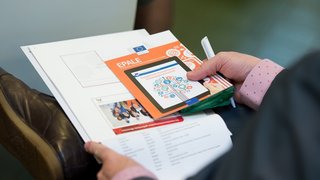
At a United Nations summit the “2030 Agenda for Sustainable Development” is adopted under the title “Transforming our world: the 2030 Agenda for Sustainable Development”. All 193 member countries of the United Nations commit themselves to working towards the implementation of the 2030 Agenda with its 17 Sustainable Development Goals (SDGs) at national, regional and international level by 2030. Europe is experiencing a massive wave of migration. At the EU level an agreement is reached on areas of action concerning the migration and refugee crisis. The federal government starts the “pan-Austrian university development plan” (GUEP) and the central school-leaving examination takes place at academic secondary schools (AHS) and colleges for higher vocational education (BHS) for the first time. The EU-funded platform EPALE (Electronic Platform for Adult Learning in Europe) is launched. The OeAD is entrusted with the implementation of the Citizen Science programme and the 1st Citizen Science Award is offered. The OeAD starts preparing support measures for refugees under the title “OeAD4refugees”.
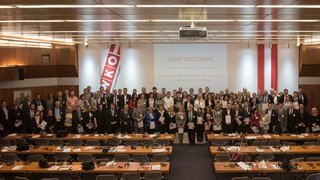
In the United Kingdom more than 51% vote in favour of leaving the EU (“Brexit referendum”). The ministry of science presents the Higher Education Mobility Strategy 2016. The joint statement on “Building a Western Balkans Alliance for Work-Based Learning” is presented at the Western Balkans Summit in Paris – one year earlier the Federal Ministry of Science, Research and Economy (BMWFW) as well as the Federal Ministry of Education and Women's Affairs (BMBF) and the Federal Ministry for European and International Affairs (BMEIA) organised the conference together with the Austrian Chamber of Commerce (WKÖ), the Austrian Development Agency (ADA) and the OeAD (KKA) in Vienna. The first bilateral Erasmus+ cooperation seminar after the worldwide opening of the programme takes place, the target country is Israel – through networking with international partners it has become possible to open up new regions.

The “60th anniversary of the Treaties of Rome” is celebrated; they are referred to as the “birth certificate” of the EU. The “White Paper on the Future of Europe” is published and serves as a reflection and discussion paper. ERI SEE (Education Reform Initiative of South Eastern Europe) is established as an international organisation. The 30th anniversary of Erasmus is celebrated with a great number of presentations and events to present exchange opportunities within the programmes. Austria, for example, celebrates 100,000 Erasmus students since 1992. Erasmus+ also brings about projects, and Austrian higher education representatives visit Iran. In Austria the “Education Reform 2017” is adopted with the aim of adapting the Austrian education system to current and future challenges and optimising the framework conditions for schools. Moreover, the Ministry of Education sets the first few strategic goals for “School 4.0”. The OeAD launches the new podcast series “Alumni AudioLab”, expands the lectureship programme and goes online with the Study in Austria website. The website provides information about study options and living conditions in Austria. The Austrian Reference Point for Quality Assurance in Vocational Education and Training (ARQA-VET at the OeAD) celebrates its 10th anniversary.
Photo: OeAD Higher Education Conference 2017: from left to right: Stefan Zotti (OeAD managing director), Dmitri-Alexander Jilin (Vienna University of Technology), Gerhard Volz (OeAD), Sarah Babinger (FH Joanneum University of Applied Sciences), Heribert Wulz (Federal Ministry of Science, Research and the Economy (BMWFW)), Daniela Schilcher (Music and Arts University of the City of Vienna), Ernst Gesslbauer (OeAD) and Johannes Gasser (University College of Teacher Education Vienna/Krems)
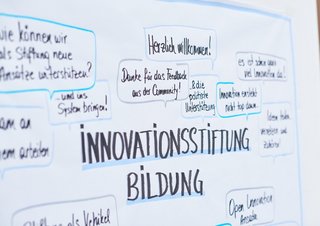
Symbolic photo of the Innovation Foundation for Education
Austria holds the presidency of the EU Council for the third time. The entry into force of the General Data Protection Regulation (GDPR) has an influence on many people’s daily working lives. The European Year of Cultural Heritage is proclaimed; in Austria the “Year of Remembrance 2018 – 100 Years Republic of Austria” is celebrated. Many cultural education activities address this topic, the House of Austrian History is opened and also shows results of schools’ dealing with the topic. The “Foundation for Innovation in Education” starts its activities, the OeAD is the foundation’s headquarters and the OeAD’s managing director is also the foundation’s chairman.

Macedonia is renamed North Macedonia. All over Europe as well as at the OeAD preparations are underway for the UK’s leaving the EU. The OeAD implements its flagship programme Erasmus+ Education; we offer a broad portfolio to support higher education institutions and individuals with regard to academic stays in Austria (incomings) or abroad (outgoings) and for cooperation between Austrian and international institutions. Regional higher education networks operate in the geographical focus areas of Southeast Asia (ASEA-Uninet) and the China/Asia-Pacific region (Eurasia-Pacific Uninet, EPU). Preparatory work for the cooperation network Africa-UniNet takes place in 2019, and in 2020 the network is launched by the Federal Ministry of Education, Science and Research (BMBWF), the University of Natural Resources and Life Sciences, Vienna (BOKU) and the OeAD. With the Bologna Service Point, ECVET (the European Credit System for Vocational Education and Training), EURAXESS (for mobile researchers), Euroguidance, Europass, eTwinning, EPALE and the National Qualifications Framework (NQF) the OeAD also supports the recognition and comparability of educational qualifications and educational content in Austria and Europe. The higher education mobility programme CEEPUS complements the OeAD’s portfolio with a focus on Central and South-Eastern Europe. Under the title “Teaching Abroad” the lectureship programme and science education (KKA) round off the offerings.
Photo: The Africa-Uninet is launched.
2020s
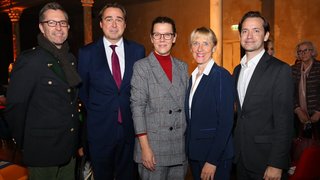
The United Kingdom leaves the EU (“Brexit”) and the Covid 19 pandemic is spreading worldwide. Both have implications for mobility patterns in Europe and education in Austria. The European Commission, together with the national agencies for Erasmus+, responds to the challenges and flexible solutions are quickly found for those affected. The Federal Ministry of Education, Science and Research (BMBWF) supports pupils and their families with the Covid-19 School Events Cancellation Hardship Fund, which the OeAD is commissioned to implement. Furthermore, there is a new edition of the “pan-Austrian university development plan (GUEP) for the years 2022 to 2027. The “European Universities” start. The BMBWF presents the national higher education mobility and internationalisation strategy 2020-2030. Besides improving the framework conditions for high quality physical mobility this strategy focuses on the internationalisation of studies and teaching. The association KulturKontakt Austria is integrated into the OeAD, which leads to an expansion of the OeAD’s portfolio to include cultural education with schools and making pre-university educational cooperation locations in Southern and South-Eastern Europe a new area of responsibility for the OeAD.
Photo: Anniversary celebration 10 years OeAD-GmbH and 30 years KulturKontakt Austria as well as integration of KKA in the OeAD. from left: Chairman of the OeAD’s Supervisory Board Elmar Pichl, Chairman of KKA’s Board of Directors Hanspeter Huber, Federal Minister Iris Rauskala, Chairwoman of the OeAD’s Strategy Advisory Board Barbara Weitgruber, OeAD’s Managing Director Jakob Calice
![[Translate to English:] 60 Jahre OeAD - Agentur für Bildung und Internationalisierung Anniversary event 60 years of OeAD](/fileadmin/Dokumente/_processed_/7/9/csm_20211116_60_Jahre_OeAD_c_OeAD_APA_Rastegar12_15b233d8a7.jpg)
By law the OeAD is given a new name: “OeAD-GmbH – Agency for Education and Internationalisation”. For the first time in the OeAD’s history the new funding agreement with the Federal Ministry of Education, Science and Research (BMBWF) gives the OeAD a long-awaited three-year planning security. The EU starts the new Erasmus+ and ESC programme period 2021-2027; Austria will (presumably) receive 683 million euros in EU funds. Digital transformation, environment and combating climate change (Green Erasmus) as well as virtual mobility and cooperation will be intensified. Inclusive access to the programmes becomes a special focus for the next seven years. As the national agency for Erasmus+ the OeAD will also be responsible for the youth sector as of 2021. Furthermore, as of this year the OeAD becomes the national agency for the EU programme “European Solidarity Corps” (ESC). The OeAD prepares the “National Inclusion Plan” for Erasmus+, involving its stakeholders and customers. It acquires a cooperation project for school development in Albania in cooperation with the city of Vienna. As an education agency the OeAD supports the Austrian federal government’s “Digital Learning” initiative. This is the largest investment the federal government has ever made in digital education. The Digital School is also the biggest reform since the introduction of free textbooks with an excess/deductible. With “Kultur:Bildung” the most comprehensive programme for cultural education in Austria starts. The science education programme “Sparkling Science 2.0” for cooperation between research institutions and educational institutions also starts and the new state quality label for learning apps is implemented. The third phase of the APPEAR programme to promote high-quality research between Austria and priority countries of the Austrian development cooperation also starts.
Photo: 60 years OeAD - Experience, Education, Future. From left: OeAD’s Managing Director Jakob Calice, Chairwoman of the OeAD’s Strategy Advisory Board Barbara Weitgruber, the Minister of Education and Science Heinz Faßmann, and Chairman of the OeAD’s Supervisory Board Elmar Pichl.
![[Translate to English:] Sasso_Larndorfer_2016_c_OeAD Contemporary witness Käthe Sasso (left in the picture) is talking to a man in his early 40s in a library room. There is a gas bottle of water on the table in front of them.](/fileadmin/Dokumente/_processed_/5/6/csm_Sasso_Larndorfer_2016_c8073ccbad.jpeg)
Russia starts a war of aggression against Ukraine. The European Council grants Ukraine and the Republic of Moldova candidate status and offers support. Brussels proclaims the European Year of Youth. The EU starts accession talks with North Macedonia and Albania. The EU-Africa Summit advocates a stronger partnership with a "continent full of opportunities". The European School Education Platform starts. Austria supports Kosovo's closer ties with the EU and the Council of Europe. Internally, Austria has to deal with a shortage of teachers and apprentices, the exodus of skilled workers from rural areas and increasing scepticism towards science. An amendment to the public sector employment law is intended to offer additional opportunities for persons from different professional or educational backgrounds to enter the teaching profession.
The OeAD closes the cooperation office in St. Petersburg and supports Ukraine in particular by training teachers in trauma management. The Ernst Mach Ukraine Special Scholarship for Ukrainian students is launched alongside a number of other measures for Ukraine. At the beginning of the year the association erinnern.at is integrated into the OeAD and becomes the OeAD's programme for teaching and learning about National Socialism and holocaust under the title ERINNERN:AT. A package of measures to "prevent antisemitism through education" follows. The OeAD starts the Erasmus+ apprenticeship campaign "Apprenticeship without Borders". The OeAD commits itself to strengthening confidence in science with the #youngsciencerocks campaign. The OeAD also organises the conference on "Cultural Education, Resilience and Sustainability" in Vienna and is given co-responsibility for implementing the FTI Pact 2024–2026. 30 years of Erasmus+ in Austria and 30 years of the Franz Werfel Scholarship are especially celebrated.
Photo: The resistance fighter and Ravensbrück survivor Käthe Sasso together with Peter Larndorfer during a school visit.
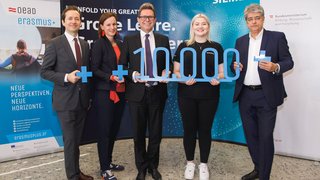
Croatia introduces the euro and joins the Schengen area. On 7 October Hamas carries out a fatal terrorist attack on Israel. The EU focuses on expanding the common education and research area and invests more than 400 million euros in university networks.
In Austria the number of degrees awarded at public universities rises to an all-time high. The Institute for Advanced Studies (IHS) presents a study on the causes of scepticism towards science and democracy. The Ministry of Education and the OeAD award the title of Digital School to a school in Austria for the first time (Sir Karl Popper School in Vienna). The Ministry of Education is working to expand educational cooperation with the neighbouring countries in Central Europe. At the same time pupils are involved in the development of curricula for the first time. The new University of Applied Sciences Development and Financing Plan 2023/24–2025/26 starts an intensive discussion process. Budget negotiations with the higher education institutions turn out to be complex.
The Ministry of Education launches the Action Plan for a Comprehensive STEM Skills Initiative and with Klasse Job the largest teacher recruitment campaign in the Second Republic. The Research and Technology Report 2023 provides an overview of the current research policy. An OECD study confirms both Austria's pioneering role in vocational education and training and the attractiveness of its higher education system. Ukrainian students do not have to pay tuition fees at universities and university colleges of teacher education in the summer semester 2024 either. Artificial intelligence (AI) and Chat GPT are making the teachers’ feelings run high, with questions being raised about the usefulness of pre-scientific papers, among other things.
At the beginning of the year the Erasmus+ Sport contact point is integrated into the OeAD.
The OeAD sees the 10,000th Erasmus+ apprentice off together with stakeholders and is commissioned by the Austrian health insurance provider ÖGK with the administration of 50 medical scholarships (around 60 applications are received). The ERINNERN:AT programme makes a significant impact in its sphere of influence throughout the year, for example by helping to shape school curricula, and thus makes a key contribution to the prevention of antisemitism, extremism and fanaticism at schools and to the development of a culture of remembrance in the whole society. The Bologna Day 2023 is dedicated to the internationalisation of higher education institutions. The OeAD continues to be successfully involved in the Children's and Youth Universities.
At the start of the school year in the autumn the OeAD presents a comprehensive offer for schools. At the start of the school year in the autumn the OeAD presents a comprehensive offer for schools, which is funded by the EC and the Ministry of Education: as the leading national funding agency in school education it presents a wide range of initiatives that open up innovative and modern teaching opportunities for schools. The offers cover a wide range of topics, from international exchange to cooperation with renowned research and cultural institutions.
Austria conducts research in Africa-UniNet together with partners from 17 African countries.
On 13 October the OeAD, together with the State Secretary for Digitisation and Telecommunications, introduces the Digital Skills Office (in the first phase 36 adult education providers carried out around 800 workshops with more than 8,500 participants in more than 200 municipalities). The OeAD and the USC Shoah Foundation are expanding their cooperation on Holocaust education. At the Young Science Congress on 19 October the Ministry of Education and the OeAD present the Citizen Science Award to schools from all over Austria. OeAD student housing celebrates its 25th anniversary.
Photo: Austria's 10,000th Erasmus+ apprentice is seen off. From the left: OeAD Managing Director Jakob Calice, Deputy Secretary General of the Austrian Chamber of Commerce Mariana Kühnel, Education Minister Martin Polaschek, apprentice Maria Wenger, CEO of Siemens AG Austria Wolfgang Hesoun
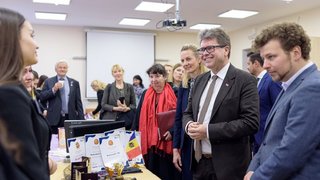
The main issues are Russia's war of aggression against Ukraine and the war in Israel and Gaza. The 10th European elections take place. Donald Trump wins the presidential elections in the United States of America.
The Austrian Parliament establishes a service centre for artificial intelligence. National Council elections are held in September, with the FPÖ emerging as the strongest party for the first time.
The Ministry of Science and Research passes the Higher Education Act 2024. The DNAustria campaign to strengthen trust in science and democracy starts. As part of the national strategy for schools abroad the eighth Austrian school abroad is established, this one in Chișinău, Moldova. The Ministry of Science and Research’s research infrastructure database is one of the most innovative projects in Europe. The Fachhochschulen can now rename themselves ‘Hochschulen für Angewandte Wissenschaften’ (‘universities of applied sciences’). The Ministry of Science and Research approves a budget that is satisfactory for universities. Terms such as financial education, doctorates at universities of applied sciences, hostility towards science, burnout and mental stress among students, digital skills, Chat GPT and artificial intelligence, democracy education, teacher shortages, antisemitism, and prevention of violence and extremism dominate the public discourse in education.
Jakob Calice is reappointed as managing director of the OeAD. A digital memory landscape (DERLA) makes the horrors of National Socialism visible in Burgenland. DERLA – implemented by the OeAD in cooperation with the University of Graz – is awarded the Austrian State Prize. The new funding programme Kunst ist Klasse! (Art at school is great!) starts. In 2024 the OeAD celebrates the 20th anniversary of educational cooperation in the pre-university sector with the Republic of Moldova and 20 years of successful implementation of Erasmus Mundus. The Digital Skills Offensive project wins the eGovernments competition. The recognition agency ENIC NARIC Austria is integrated into the OeAD and becomes the central office for the recognition of academic degrees from abroad in Austria. The OeAD boasts more than 30,000 stays abroad within the framework of Erasmus+ for the first time. In the autumn the new OeAD competition Young Science Days at Schools is launched.
Photo: from right to left: the Moldovan Minister of Education Dan Perciun, the Austrian Minister of Education Martin Polaschek, and other people from the Ministry of Education
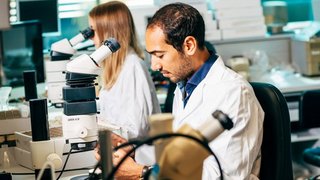
Ongoing and new wars, crises and threats dominate the international stage.
Donald Trump's second term in office brings changes in the United States, especially in school, higher education and research policy as well as in the financing of USAID, which also have an increasing impact on Europe. In response to the new US higher education and research strategy the European Union’s member countries begin to establish framework conditions designed to enable students and researchers from the US in particular to continue their academic careers and studies in Europe. The European Union proclaims the International Year of Quantum Physics and launches its education offensive for a competitive future, Union of Skills. The European Commission presents the new EU Life Sciences Strategy Choose Europe for Life Sciences.
At the beginning of March the new Austrian Federal Government takes office and decides, among other things, to separate the ministries for education (Austrian Federal Ministry of Education, Science and Research, BMB) and science and research (Austrian Federal Ministry of Women, Science and Research, BMFWF) once again. Austerity measures bring about cuts in funding for Austrian Development Cooperation (ÖEZA), among other things. The Austrian Federal Ministry of Education (BMB) intensifies measures to improve reading skills and reduce mental stress among pupils, launches an offensive to reduce bureaucracy at schools and improve reading skills and puts a stronger emphasis on providing measures to improve pupils’ knowledge of German. Artificial intelligence finds its way into more and more areas of life. There are several anniversaries to celebrate: 80 years since the end of the Second World War, 70 years since the signing of the State Treaty, 30 years since Austria joined the EU, 30th anniversary of the introduction of the Fachhochschulen (FH) (universities of applied sciences), 20 years of Europass and 10 years of the Citizen Science Award.
The Austrian Federal Ministry of Women, Science and Research (BMFWF) and the OeAD recognise outstanding examples of the implementation of the National Strategy for Higher Education Mobility and Internationalisation with the Internationalisation Award. ERINNERN:AT / Holocaust Education commemorates the liberation from Nazi dictatorship 80 years ago. The OeAD starts the implementation of the new scholarship programme Students at Risk.
